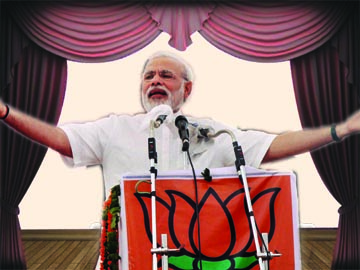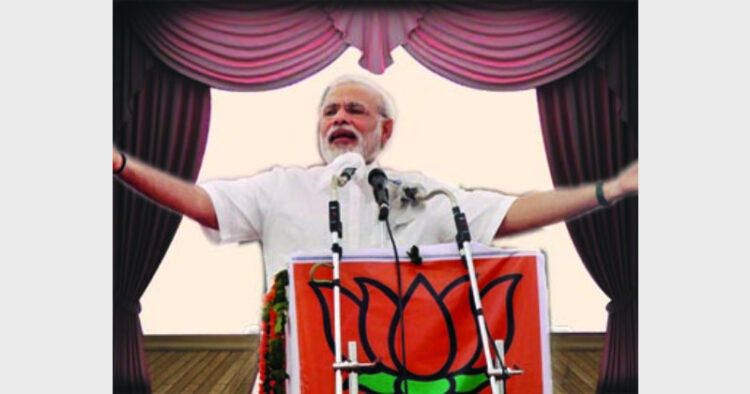 The curtain is raised for 2014 general elections with the anointment of Narendra Modi as Prime Ministerial candidate of the main Opposition Party. Though there are attempts to nullify the Modi effect by invoking the secular-communal bandwagon, there is a need to understand ‘leadership’ issue in perspective.
The curtain is raised for 2014 general elections with the anointment of Narendra Modi as Prime Ministerial candidate of the main Opposition Party. Though there are attempts to nullify the Modi effect by invoking the secular-communal bandwagon, there is a need to understand ‘leadership’ issue in perspective.
It is beyond doubt that country is passing through a severe leadership crisis at the helm of affairs. Incessant corruption, relapsing economy and endangered security is hardly being addressed. The dual leadership model provided by the UPA, where power and responsibility is inversely proportional, has utterly failed. The nation, especially the youths, is looking for decisive, credible and dynamic leadership and popular mood vividly exhibits the undisputable alternative in the form of Modi. In contrast to the mute and remote controlled leadership of present Prime Minister, Modi has clarity of ideas, skill of communicating with the masses, vision for development and experience of governance.
More importantly, India is looking for a leadership evolved from the grass roots. The dynastic leadership of Rahul Gandhi wants all power without taking any responsibility. The regional avatars like Akhilesh Yadav are turning out to be disaster. Neither ‘family run’ outfits nor parochial regional parties can provide an evolved leadership. On the contrary, Modi has started from a small village of India, have experience of ground realities, advanced through difficult path of organisation building and then acquired acceptance through performance. This stark contrast has made the leadership plausible.
The reaction of political parties to this anointment is amusing. They should be happy if this internal decision of BJP is ‘suicidal’, as declared by Nitish Kumar and Congress. Instead of relief, there is a sense of panic in their remark, perhaps because they are facing the formidable and invincible challenge of a mass leader.
When the emerging leader is trying to bring the issues of ‘good governance’ at the forefront, it is unfortunate that the intellectuals and media backed by the ‘Bharat Nirman’ campaign suddenly stopped questioning the Congress fallacies and have started shouting ‘secularism in danger’ chant. The forged notion of ‘secularism’ has become a convenient cover up to corruption and non-performance. There is a need to focus on leadership and governance issues for rejuvenating the India story.
‘String Pullers’ of the Riots
The sting operations carried out by some sections of electronic media has clearly exposed the real string pullers of Muzaffarnagar riots. It is unfortunate that while issuing warrants against leaders of all political parties, main culprits, the Samajwadi Party and Congress leadership, are left scot-free.
Azam Khan, the main string puller of riots, is continued to be the Parliamentary Affairs and Minority Welfare Minister in the UP Government and Guardian Minister of Muzaffarnagar district. He has been using his weight to keep the appeasement as the core policy of UP Government. For the father-son duo of ruling party, who holds another string of riots, has made criminalism and communalism as their thriving points. The systematic building up of communal tensions for petty vote gains was carried out by the ruling establishment through policies and administrative meddling in favour of one community and disregarding the other. The UP is a classic example where common people are paying the price for dirty vote-bank politics. Equality of law and standing behind the upright officers should be the guiding principal in handling law and order situations and not communal considerations.
In the rat race for minority vote, Congress leaders are the highest level of string pullers. On the one hand the Centre is a mute spectator to the ‘secular drama’ of the UP Government. On the other hand, the top most trio of the Government, who did not have time to visit the Kishtwar victims in Jammu and Kashmir, paid visit to the government aided camps established for minorities, again fueling sentiments of both the sides. The selective secular visits by political parties to communally sensitive areas will further flare up the situation.
It is not the individuals but the basic philosophy and approach of this ‘secular saga’ the root cause of communal tensions in India. It is time to end this ‘drama of secularism’ by cutting the strings of these vote catchers.














Comments